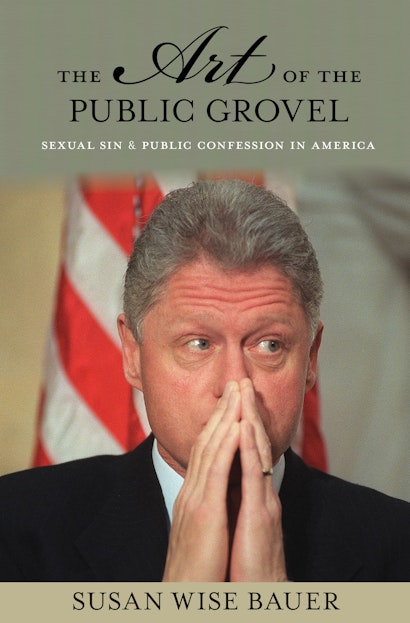Whether you are a politician caught carrying on with an intern or a minister photographed with a prostitute, discovery does not necessarily spell the end of your public career. Admit your sins carefully, using the essential elements of an evangelical confession identified by Susan Wise Bauer in The Art of the Public Grovel, and you, like Bill Clinton, just might survive.
In this fascinating and important history of public confession in modern America, Bauer explains why and how a type of confession that first arose among nineteenth-century evangelicals has today become the required form for any successful public admission of wrongdoing—even when the wrongdoer has no connection with evangelicalism and the context is thoroughly secular. She shows how Protestant revivalism, group psychotherapy, and the advent of talk TV combined to turn evangelical-style confession into a mainstream secular rite. Those who master the form—Bill Clinton, Jimmy Swaggart, David Vitter, and Ted Haggard—have a chance of surviving and even thriving, while those who don’t—Ted Kennedy, Jim Bakker, Cardinal Bernard Law, Mark Foley, and Eliot Spitzer—will never really recover.
Revealing the rhetoric, theology, and history that lie behind every successful public plea for forgiveness, The Art of the Public Grovel will interest anyone who has ever wondered why Clinton is still popular while Bakker fell out of public view, Ted Kennedy never got to be president, and Law moved to Rome.
Some images inside the book are unavailable due to digital copyright restrictions.
Awards and Recognition
- Honorable Mention for the 2008 PROSE Award in Media and Cultural Studies, Association of American Publishers
"[A] very entertaining book. Reading this book is like putting the noses of these famous men . . . in the mud all over again. Bauer's book, however, is more than a seminar in how to cringe with dignity. It is a lesson in how religious rituals, no matter how old they are, never die. Bauer is a skilled analyst of political rhetoric. She is also a terrific writer."—Stephen H. Webb, Christianity Today
"[E]legant in its simplicity and surprisingly persuasive."—Susan Bordo, Chronicle Review
"[A]n engaging, sophisticated and wholly persuasive account of how some public figures get away with transgressions and some do not. And the thread linking all of them is the practice of religion. [Bauer's] accompanying texts of successful and failed confessions complete an elegant study, also useful for any aspiring public figure."—Jurek Martin, Financial Times
"Why do some public figures get away with sexual transgressions while others do not? This is the central question posed in Bauer's important and informative book. . . . [A] fascinating book that is at once entertaining and thought-provoking. As a seminar in how to cringe with dignity, this book should be required reading for all public figures—and those who aspire to be."—Choice
"[T]his exhaustively researched book offers a fascinating trip through more than a century of America's top sex scandals."—Karen Holt, Barnes & Noble Review
"As a bonus, Bauer append the texts of statements by six confessors. Connoisseurs of venial sin will want to compare and contrast."—James Boylan, Columbia Journalism Review
"Bauer's gallery of scoundrels is . . . worth a lingering visit. And the book includes as an appendix a handy collection of the confessions and apologies of Kennedy, Carter, Bakker, Swaggart, Clinton, and Law. For this alone, I intend to keep my copy on the shelf beside my hardbound edition of The Confidence Man."—Peter W. Wood, American Conservative
"People interested in the reasons why confession is different than apology, and how to tell the difference the next time a Senator is caught in a men's room with a 'wide stance' will enjoy this humorous and fascinating book. Wannabe politicians and public figures should keep a copy for reference on hand for the almost inevitable slip up."—Sacramento Book Review
"Wise Bauer's analysis and background make for lively reading. As readers go along with her, they learn something about both rhetoric and democracy itself. . . . Besides its study of rhetoric and cultural trends, Wise Bauer's book also supplies a rather hilarious review of past scandals and shenanigans. Members of First Secular Humanist will enjoy these."—Tom McBride, Common Review
"[A] canny analysis of American political symbolism."—Laura Miller, Salon.com
"Interesting, well-written, and well-researched, this book should have wide appeal. Who doesn't want to read about sex and confession and how the mighty fall and, in some cases, get up again?"—Stephen Prothero, author of Religious Literacy: What Every American Needs to Know—and Doesn't
"This very fine book will enrich and deepen the conversation about religion and public life in America. Bauer writes clearly and vividly and she balances good storytelling with sound scholarship."—Alan Jacobs, author of Original Sin: A Cultural History


